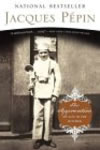The Apprentice: My Life In The Kitchen
by Jacques Pepin
A widely-read autobiography of a much-liked chef and teacher, this book often tells us the wrong things. Pepin is interesting because his food is interesting and because he taught us about La Technique. Here, he tells us more about being Jacques Pepin than we need to know, and writes too little about the food.
We're not here because Pepin is a wonderful fellow, though no doubt he is, nor because he's done interesting things. His wonderfulness is great, it's a bonus, but it's not the point: we're here for the food, and the food is usually squeezed between celebrity encounters, home renovations, memories of favorite teachers and students, and amusing but harmless disasters like the time the wild snails escaped.
Pepin writes a good deal about Craig Claiborne, who was the New York Times' pioneering restaurant critic and who was clearly an important and formative influence on Pepin. But the focus is not particularly on the idea of food, even with Claiborne; when we hear of the big meals they made together, the emphasis stays on what fun the meals were, not on the idea of the food. In fact, Pepin rarely discussed food with anyone in this book. Pepin's portrait of his last meeting with Claiborne is literally heartless, an unsympathetic surface impression of a dying man who had once been Pepin's friend. What really went wrong between Pepin and Claiborne would be interesting to know, but it's not here.
Pepin is at pains to remind us that the food business is a business, but he seldom follows the money in any but the most familiar ways. He opens, and then closes, a restaurant, recounting the anecdote as his wife's discovery that running a restaurant chains you to the work. This isn't news. Surely, they asked themselves whether they could hire people and free themselves sufficiently, rather than just abandoning a thriving business. The calculus that led the Pepins to reject the idea would be interesting to know, but it's not here.
